Secrets, Spies, and a Sleuthy Disguise
It's-a me, Mister Plorg, and here we will be talking about the Top 13 New EDH Dimir Cards from Guilds of Ravnica, in no particular order. Dimir is the combination of both blue and black, perhaps more commonly known as 'redless Grixis' or 'redless blue Rakdos.'
Why only thirteen cards, you ask? Because these are the only new multicolored Dimir cards (or specifically mono-black or mono-blue cards that also have the Dimir waterwark) in the Guilds of Ravnica set that are relevant to the Commander format. All the rest that aren't mentioned here are therefore completely, totally, and utterly useless in EDH and thus not worthy of discussion on EDHREC. Feel free to vehemently disagree about specific examples by demonstrating your thoughtful writing skills in the comments at the end of this article!
One quick thing: we aren't going to talk about reprints. Yes, a lot of EDH decks are going to want a Watery GraveWatery Grave, but a lot of EDH decks already had a Watery Grave before this set, so it's disqualified.
Why aren't these cards ranked in order from subjective worst to best or vice-versa? Naturally, to give people something to complain about in the comments!
Off we go!
Etrata, the Silencer
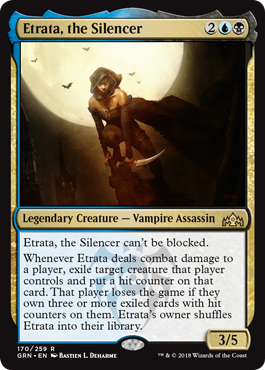
Etrata, the SilencerEtrata, the Silencer has perhaps the most flavorful ability in the set. She stalks a player, unstoppable by normal means, killing a mini-boss and making both the body and herself disappear. After a suspenseful wait, she strikes again and another henchman vanishes. The boss retreats to the panic room with the last remaining bodyguard and sounds the alarm. They can see her coming on the monitors, but nobody can slow her down. She walks right up to the door and it opens to her will, revealing the boss in a nervous sweat, stammering at the inevitable doom that stares them in the face from a few feet away. Closer now. Too close.
By attacking, Etrata functions as creature removal. If the rules text stopped right after "exile target creature that player controls," this card would still be very playable both as a commander and in the 99. The hit counters and forced game loss are bonus gravy that turns repeated creature removal into player removal.
Note that token creatures can be exiled, but they can't have a hit counter placed on them after they are exiled. Also note that if the defending player has no creatures, then nothing is exiled and no hit counter can be placed. If they have a sacrifice outlet, they might prefer to sacrifice their entire board to their graveyard to prevent the exile and hit trigger, especially if they have dependable graveyard recursion. In short, Etrata's game-loss ability might not work as well against reanimator decks or token decks. It could be funny to watch her kill the same Torrent ElementalTorrent Elemental or Eternal ScourgeEternal Scourge several times, but until three different nontoken creature cards get hit counters, the defending player is still in the game. Another way to look at it is that if she gets two creatures exiled with hit counters from the same player, then that player might want to voluntarily stop casting any more creature spells.
While damage no longer goes on the stack, triggers that happen from combat damage do go on the stack. So after the damage is inflicted, if you want to respond to the combat damage trigger by bouncing Etrata to your hand at instant speed or flickering her, for example, then you can, and her ability will still resolve without shuffling her away or forcing you to put her into your command zone. Something to consider.
Unmoored Ego
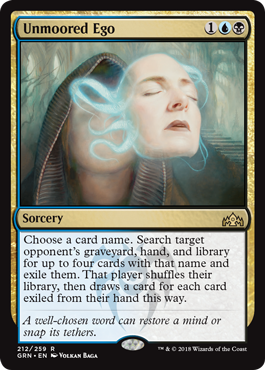
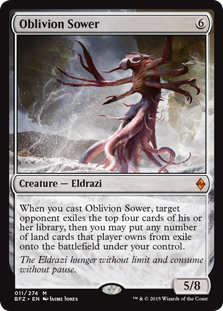
At three mana, Unmoored EgoUnmoored Ego lets us see one opponent's hand, look through their entire library to see what their deck is up to, and note what bombs to anticipate. But let's ignore that part for now. Reading further, at first it seems like it's not a card for EDH, since it talks about more than one card with the same name, and we play singleton decks. However, notice that it has no problem with you choosing a basic land. Against many four- or five-color decks, this card could remove all of one type of basic land if the opponent's mana base on board is weak in a particular color, and thus you make it slightly harder for that opponent to use the color you exile. Consider it as color-specific mass land destruction by a time-traveler. Like if you were to go back in time to kill someone's grandfather to prevent the descendant from being born, but instead of people in the past, we are now killing the conceptual grandfather of a future mountain range or archipelago or rainforest that is yet to exist. Prechronochromoterracide.
Even better, if we're playing the kind of mill-and-exile deck that gets a lot of mileage out of Oblivion SowerOblivion Sower, then here's four more lands for you to steal.
Worst case, you choose Cyclonic RiftCyclonic Rift and one of the other blue players doesn't get to have it. Not bad for a worst case.
Mnemonic Betrayal
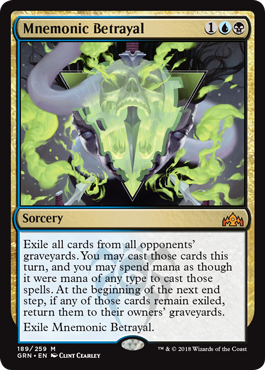
Mnemonic BetrayalMnemonic Betrayal looks good until you read the last two sentences. Exiling all enemy graveyards is good. Casting your opponents' cards using any type of mana is good. Putting the exiled graveyards back at the end step is not so good, and exiling this card means we can't realistically expect to use it again.
However, if we can make infinite mana of any color (or non-color), then the card is just amazing, since we can cast every last spell in every enemy graveyard. It gets better if we already used some Dimir-colored mill to put a lot of enemy cards into those enemy graveyards. So, if you're the type to include Pili-PalaPili-Pala and Grand ArchitectGrand Architect, for example, or maybe PalinchronPalinchron and High TideHigh Tide, or Deadeye NavigatorDeadeye Navigator and Peregrine DrakePeregrine Drake, or perhaps something involving Rings of BrighthearthRings of Brighthearth and/or Basalt MonolithBasalt Monolith, or Brighthearth with Cabal CoffersCabal Coffers and Deserted TempleDeserted Temple, or a similar trick with Magus of the CoffersMagus of the Coffers and Umbral MantleUmbral Mantle... Anyway, if you're the type to include one of those combos and you want to cast every card in each other player's graveyard in the same turn, Mnemonic Betrayal can help you do exactly that.
Notion Rain
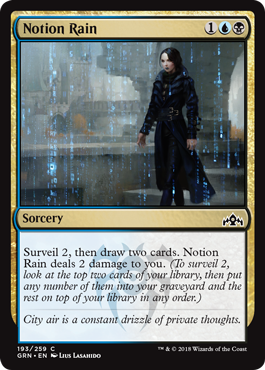
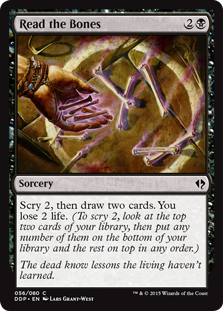
Read the BonesRead the Bones is currently in over 13,000 decks, for some reason. Maybe that reason has to do with the inertia of being included in Commander precons for two different years. The fact is, cards included in precons often have higher usage numbers than objectively better cards that aren't included in precons. If you like Read the Bones, but also have reason to fill your own graveyard or if you just really like the Matrix movies, then maybe Notion RainNotion Rain is right for you. If you only care about getting the best card from near the top of your deck, then may I suggest Diabolic VisionDiabolic Vision. It's only in around 400 decks right now and could use the love.
Discovery // Dispersal
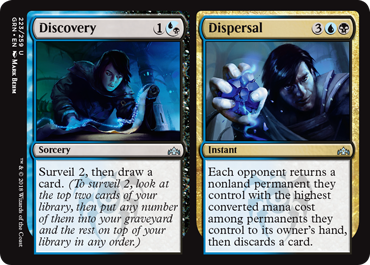
You've probably already read Mason's article for EDHREC's preview card, right?
Guilds of Ravnica adds a new cycle of "Jane Austen" split cards, which effectively count as two cards due to their flexibility. Consider them as a modal spell with two wildly different modes (and mana costs). Speaking of mana costs, I expect many EDH tables to be calling their nearest judge over when Yuriko, the Tiger's ShadowYuriko, the Tiger's Shadow smacks them and shows one of these on top of their deck. (You do add up the mana costs.)
DiscoveryDiscovery is easy to cast and surveil is a generally useful effect to dig a little bit into the deck, more so in self-mill themes that have reason to fill their own graveyard.
DispersalDispersal is comparable to Crackling DoomCrackling Doom; they are both instant speed, they both have my favorite two-word phrase on a magic card ("each opponent"), they both have a type of removal that gets around indestructible creatures, and they both say "highest" or "greatest" instead of "target." Lacking the word "target" is an important but often underestimated point. If you happen to be in a meta against three Voltron commanders, then Dispersal can probably remove all of them at the same time, no matter how much hexproof and shroud they are wearing.
Connive // Concoct
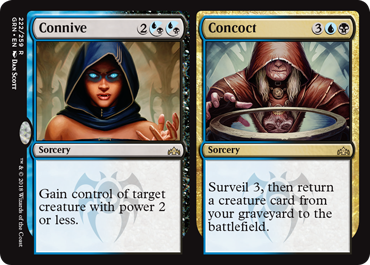
ConniveConnive is comparable to Enthralling VictorEnthralling Victor or Welcome to the FoldWelcome to the Fold at the same converted mana cost.
ConcoctConcoct is somewhat similar to Extract from DarknessExtract from Darkness at the same converted mana cost, but it only affects your own topdeck and graveyard. Surveil 3 doesn't necessarily mean milling oneself. It could be equivalent to activating a Sensei's Divining TopSensei's Divining Top, milling for three, or somewhere in between.
Both halves are playable, which makes the versatility as a whole more attractive. This will rarely be a dead unusable card in your hand, no matter what kind of Dimir or Dimir-associated color aggregate you are playing.
Thief of Sanity
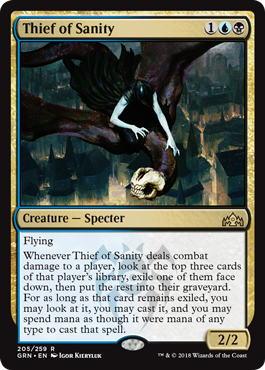
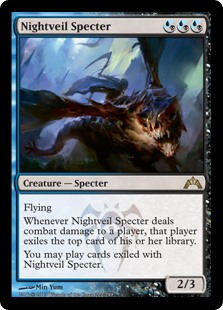
I've always liked the concept of Gonti, Lord of LuxuryGonti, Lord of Luxury, but wanted a more evasive body for attacking. I like the concept of Nightveil SpecterNightveil Specter, but always thought that its effect was just barely not good enough. Thief of SanityThief of Sanity sits existentially between those two cards and it just might be my favorite card in this set.
Doom Whisperer
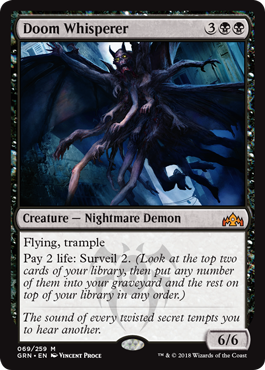
While we are on the subject of favorite flying creatures, Doom WhispererDoom Whisperer is one of the best cards in the set. Five mana for a 6/6 flying trampler is already a good deal. Being able to pay up to 38 life to put up to 38 cards in the graveyard might be extremely relevant if there are mass graveyard effects such as Living DeathLiving Death. This is a good card for Mairsil, the PretenderMairsil, the Pretender to impersonate and put up to two interesting creature or artifact cards in the graveyard on each player's turn. I'm not sure it will beat out most of the usual favorite Demons commonly used in Shadowborn ApostleShadowborn Apostle decks, but it has general utility for any graveyard strategy.
Dream Eater
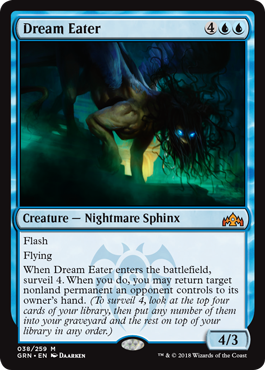
Speaking of flying Nightmares, Dream EaterDream Eater has a lot going on. Six mana might be overcosted for a normal flying 4/3, but the addition of flash with an interesting enter-the-battlefield effect can make up for that. Surveil 4 is not a trivial amount of topdeck to manipulate, and the extra bounce effect is very relevant for defensive flash tricks during other players' combat steps.
Nightveil Sprite
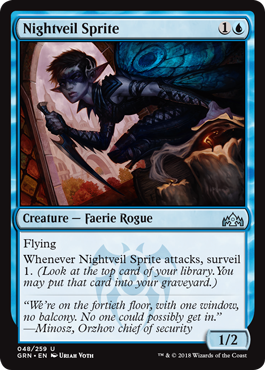
Nightveil SpriteNightveil Sprite might not look like much, but a flying creature with a combat-triggered ability for repeatable surveillance makes this card relevant.
Mission Briefing
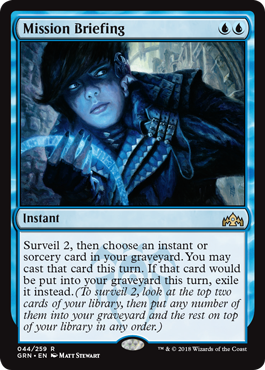
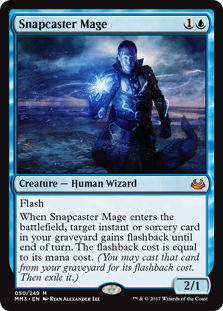
While Mission BriefingMission Briefing has no creature body attached, at instant speed it does let you recast an instant or sorcery in your graveyard for the same converted mana cost as Snapcaster MageSnapcaster Mage. Being able to Surveil 2 to maybe put a better spell or two in the graveyard first is a nice bonus.
Price of Fame
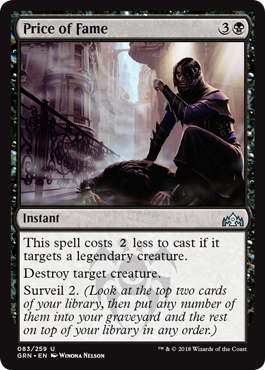
Price of FamePrice of Fame. Would you pay 2 mana to destroy an opponent's commander AND Surveil 2 at instant speed? The correct answer is yes.
Lazav, the Multifarious
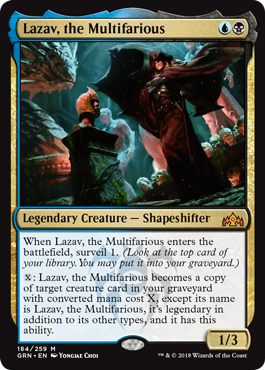
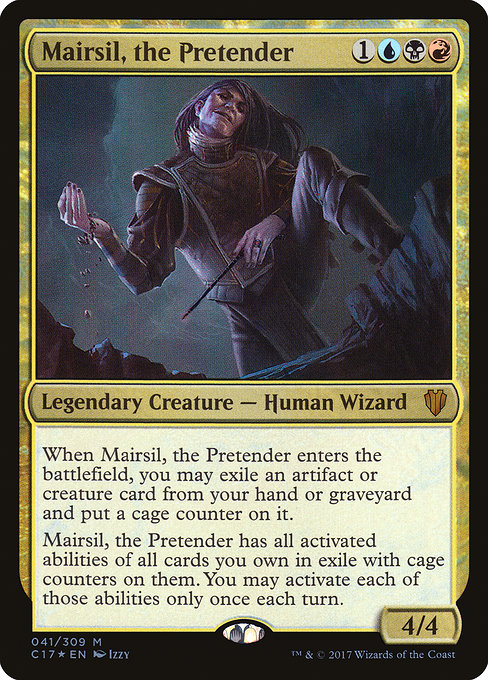
Lazav, the Multifarious has a lot in common with Mairsil, the PretenderMairsil, the Pretender. They both act as proxies for a variety of other cards in the deck. A lot of Mairsil's favorite cards are not widely seen in EDH outside of Mairsil decks, and it remains to be seen whether the same will be true for Lazav. Neither of them cares about creatures with enter-the-battlefield effects. Mairsil is more resilient, since his targets are exiled to the "cage" and are thus protected from graveyard exile. Taking out Mairsil's graveyard does not affect the availability of abilities he already has. On the other hand, exiling Lazav's graveyard sticks them in their current form, which might be a practically vanilla 1/3 that can't really do much of anything and they have to morph their current facial area into something that resembles sadness. Mairsil doesn't have to pay any mana to switch between the cards in the menagerie while Lazav will likely be using most or all of their mana to do much of anything involving more than one creature in the graveyard. The Lazav deck will work better with many low-mana-cost creatures, perhaps a mixture of blue unblockable and black Infect weenies.
After writing an article on this site about Mairsil, releasing a podcast episode about Mairsil, actually building a paper deck for Mairsil, and bringing that deck to GP Vegas to jam lots of EDH games, you might think I'm a bit biased when I say that I think Lazav is a weak Mairsil. I probably am biased, but there you go. Lazav is a weak Mairsil. Further, much like Coca-Cola, classic Lazav is better than new Lazav.
I hope you enjoyed surveilling these blue-black surveillers! Feel free to leave your resounding agreement with my evaluations in the comments below!
Nate Burgess
Nate is a game developer, programmer, and writer from San Francisco. He is a co-host of the <a href="https://www.youtube.com/CommanderTime">Commander Time!</a> podcast, a former co-host of the <a href="http://www.commanderinmtg.com/">Commanderin’ MTG Podcast</a>, and does occasional programming with EDHREC's database making piles of theme pages. Nate can be found <a href="https://twitter.com/CommandTime">@commandtime</a> and/or <a href="https://twitter.com/misterplorg">@misterplorg</a>, and as a frequent guest streamer at <a href="https://www.twitch.tv/mtg_lexicon">MTG Lexicon</a>.
Your opinions are welcome. We love hearing what you think about Magic! We ask that you are always respectful when commenting. Please keep in mind how your comments could be interpreted by others. Personal attacks on our writers or other commenters will not be tolerated. Your comments may be removed if your language could be interpreted as aggressive or disrespectful. You may also be banned from writing further comments.
